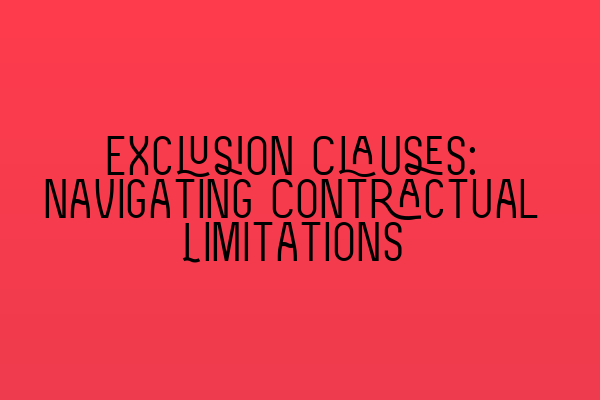Exclusion Clauses: Navigating Contractual Limitations
Welcome to SQE Contract Law, where we help you navigate the intricate world of contract law. In this blog post, we will delve into the topic of exclusion clauses and how they can impact contractual agreements. Understanding the implications of exclusion clauses is essential for both solicitors and individuals entering into contracts.
An exclusion clause is a provision in a contract that aims to limit or exclude liability for certain events or breach of contractual obligations. These clauses are often included to protect one party from potential risks or damages that may arise during the performance of the contract. However, it is crucial to navigate exclusion clauses carefully to ensure fairness and clarity.
Types of Exclusion Clauses
Exclusion clauses can come in various forms and are typically categorized into three main types:
- Exclusion of Liability: These clauses seek to limit or exclude liability for specific types of loss or damage. For example, a contract may include a clause stating that one party will not be responsible for any indirect or consequential damages resulting from a breach of contract.
- Exclusion of Implied Terms: Implied terms are those that are not expressly stated in the contract but are nonetheless deemed to be included based on the nature of the agreement. Exclusion clauses can be used to exclude or limit these implied terms. However, it is essential to ensure that the exclusion of implied terms is fair and reasonable under the circumstances.
- Exclusion of Remedies: These clauses limit the remedies available to the innocent party in the event of a breach of contract. For example, a contract may state that the innocent party’s only remedy for a breach will be a refund of the purchase price, excluding any claims for additional damages.
It is important to note that exclusion clauses must be carefully drafted and brought to the attention of the parties involved. If an exclusion clause is ambiguous or hidden within the contract, it may not be enforceable in court.
Assessing the Validity of Exclusion Clauses
The validity of an exclusion clause depends on several factors, such as:
- Reasonableness: In order to be enforceable, an exclusion clause must be deemed reasonable. The reasonableness of a clause is assessed based on factors such as the bargaining power of the parties, the clarity of the clause, and its impact on the statutory rights of the parties. If a clause is found to be unreasonable, it may be rendered void or unenforceable.
- Unfair Contract Terms Act 1977: The Unfair Contract Terms Act 1977 provides protection to consumers and other parties deemed to be in a weaker bargaining position. The Act renders certain exclusion clauses, particularly those seeking to exclude or limit liability for negligence or breach of contract, subject to the reasonableness test.
- Business-to-Business Contracts: In business-to-business contracts, the reasonableness test under the Unfair Contract Terms Act 1977 does not apply. However, parties are still expected to negotiate and draft exclusion clauses with fairness and clarity in mind.
To ensure the validity and enforceability of an exclusion clause, it is advisable to seek legal advice from a solicitor who specializes in contract law. A solicitor can review the specific circumstances of the contract and provide guidance on the potential risks and limitations associated with the exclusion clause.
Case Law Examples
Case law plays a vital role in the interpretation and application of exclusion clauses. Below are two noteworthy examples highlighting the significance of exclusion clauses:
1) Otter v. Rylands & Co (1866): In this landmark case, the House of Lords held that contractual exclusion clauses must cover liability for negligence specifically. It highlighted the importance of precise language and effective communication of the exclusion clause to the parties.
2) Thornton v. Shoe Lane Parking Ltd (1971): This case examined the reasonableness of an exclusion clause in a parking lot ticket. The court held that exclusion clauses must be clear and prominently displayed for the party to have sufficient notice of their existence.
These cases demonstrate the importance of carefully drafting and presenting exclusion clauses to ensure their validity and enforceability.
Seeking Legal Guidance
Exclusion clauses can significantly impact the rights and obligations of parties entering into a contract. It is essential to navigate these contractual limitations while ensuring fairness and reasonableness to all parties involved. Seeking legal guidance from a specialized contract law solicitor is crucial to understand the complexities and potential risks associated with exclusion clauses.
If you found this article on exclusion clauses helpful, you may also be interested in exploring related topics:
- Barrister vs. Solicitor: A Comprehensive Comparison
- Embracing the Rise of Virtual Law Practices
- Unveiling Real-Life Case Studies: Insights into Legal Practice and Decision-Making
- Exploring Solicitor Salaries in the UK: Average Earnings and Factors Affecting Income
- Mastering Client Relationship Management: Skills for Solicitors to Enhance Trust and Loyalty
At SQE Contract Law, we are dedicated to providing valuable insights and guidance on various legal topics. If you have any questions or require assistance with contract law matters, please do not hesitate to contact us.
